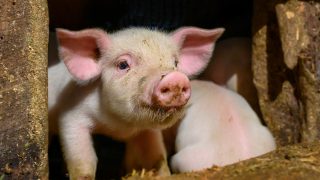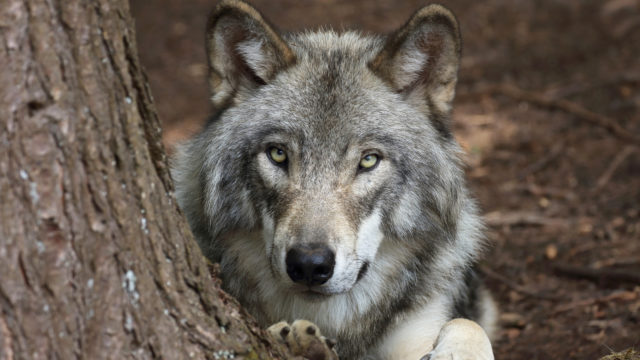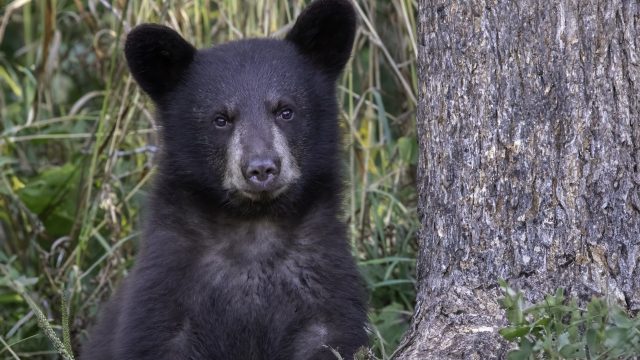
140 Public Interest Groups Urge USDA Against Inflation Reduction Act Funding Subsidizing Factory Farm Gas Industry
Factory farm gas production subsidizes corporations that have a long history of profiting from pollution at the public’s expense
Contact: media@aldf.org
WASHINGTON, D.C. — Today, a coalition of local, regional, and national organizations with a range of interests such as environmental justice, environmental protection, climate change, animal protection, sustainable farming, and food safety sent a letter that urges the U.S. Department of Agriculture (USDA) not to allocate conservation funding from the Inflation Reduction Act (IRA) toward the factory farm gas industry. Factory farm gas is methane trapped, often via a tarp covering a manure lagoon, as liquified animal waste decomposes. Factory farm gas is often referred to as “biogas,” “renewable natural gas,” “biofuel,” or “biomethane.”
The letter notes, “The IRA includes investments intended to address the worsening climate crisis by reducing GHG emissions by roughly 40 percent below 2005 levels by 2030. Approximately $20 billion has been allocated to support USDA’s agricultural conservation programs, such as the Environmental Quality Incentives Program and the Regional Conservation Partnership Program, as well as tax credits and funding for renewable energy and biofuels. One such incentive, an extension of the Energy Investment Tax Credit (Section 48) creates a 30 percent credit for “qualified biogas properties,” including factory farms with methane digesters. This amount balloons to 50 percent for certain facilities in “high energy” areas, which are already overburdened with negative externalities from energy production — a clear environmental injustice.”
“Propping up industrial agriculture through incentivizing factory farm gas will expand one of the worst polluting industries — harming surrounding communities and animals, while hindering our ability to tackle the climate crisis,” says Animal Legal Defense Fund Executive Director Stephen Wells. “It’s critical we end subsidies to industrial animal agriculture instead of allowing the industry to profit from its own pollution.”
“The USDA needs to stop denying factory farming’s enormous harm to the climate and finally take a firm stand for public health by refusing to subsidize this dirty industry through the Inflation Reduction Act,” says Hannah Connor, an attorney for Center for Biological Diversity. “We can’t prevent a climate disaster as long as millions of our tax dollars are wasted every year on propping up corporate polluters and their half-baked, techno-fix proposals that greenlight pollution instead of addressing its daily harm to communities and the environment.”
“For too long, we’ve seen federal clean energy dollars pad the pockets of industrial agriculture’s biggest polluters. Factory farm gas only continues this trend, undermining small scale farmers and paying factory farms to foul the air, water and climate,” says Food & Water Watch Food Policy Analyst Rebecca Wolf. “Those in Congress lauding the Inflation Reduction Act’s passage must ensure that its investments intended to avert climate chaos do not fall prey to industry lobbying and lies — and that not a single federal dollar go towards factory farm gas promotion. “Subsidizing factory farm gas would fail to mitigate climate change and exacerbate environmental injustice by further entrenching factory farming,” said Chloë Waterman, senior program manager at Friends of the Earth. “We urge USDA to do right by the communities suffering from factory farm pollution and invest Inflation Reduction Act funding into real solutions like regenerative agriculture.”
The letter continues, “Agricultural policy that supports the entrenchment and expansion of factory farms is a barrier to real mitigation of the climate crisis and to more sustainable and just farming methods and a diversified food system. Factory farm gas production is only compatible with industrial animal agriculture that produces far more waste than can be responsibly managed, and perversely encourages the use of liquified manure management systems – the cheapest and most environmentally destructive form of manure management. Factory farm gas incentives have already created a ‘manure gold rush’ by establishing revenue streams for the manufacture of liquid manure. These incentivize the further expansion and consolidation of the largest factory farms, which are already major polluters and sources of environmental injustice.”
In November 2022, Senator Cory Booker (D-NJ) articulated concerns about biogas at an Agriculture Committee hearing noting, “I believe that this installing of big biodigesters on manure lagoons is not a solution, and rather it’s just a form of greenwashing that doesn’t alleviate the suffering in the communities and doesn’t alleviate the harm they’re causing to the environment.”
Organizations signing the letter include: 350Brooklyn, 350 Eugene, 350 Ventura County Climate Hub, 7 Directions of Service, Acterra, Alabama Rivers Alliance, Alliance of Nurses for Healthy Environments, Allied Scholars for Animal Protection, American Society for the Prevention of Cruelty to Animals (ASPCA), American Sustainable Business Network, Animal Legal Defense Fund, Animal Partisan, Assateague Coastal Trust, A Stone’s Throw Bed & Breakfast, Beyond Extreme Energy, Brighter Green, Buffalo River Watershed Alliance, Butte County Local Food Network, Campaign for Family Farms and the Environment, Cape Fear River Watch, Caretakers of God’s Creation, Cedar Lane Environmental Justice Ministry, Center for Biological Diversity, Center for Food Safety, Church Women United in New York State, Clean Water for North Carolina, Climate 911, Climate Action Now, Compañeras Campesinas, Compassion in World Farming USA, Cultivate Empathy for All, Dakota Resource Council, Dakota Rural Action, DC Voters for Animals, Direct Action Everywhere, Don’t Gas the Meadowlands Coalition, Earth Ethics, Inc., Endangered Species Coalition, Environmental Justice Ministry Team, Cedar Lane UU Church, Extinction Rebellion San Francisco Bay Area, Factory Farming Awareness Coalition, Fair Start Movement, Farm Action, Farm Aid, Farm Forward, Farm Sanctuary, Farmworker Association of Florida, Food Animal Concerns Trust (FACT), Food & Water Watch, Friends of Family Farmers, Friends of the Earth, GMO Science, GMO/Toxin Free USA, Government Accountability Project/Food Integrity Campaign, Grassroots International, Green America, GreenLatinos, Green REV Institute, Green State Solutions, GROW North Texas, Hawai’i Alliance for Progressive Action (HAPA), HEAL (Health Environment Agriculture Labor) Food Alliance, Health Care Without Harm, Humane Society International, Humane Society Legislative Fund, Hungry Planet, Illinois Council of Trout Unlimited, Iowa Citizens for Community Improvement, In Defense of Animals, Infinite Agriculture, Institute for Agriculture and Trade Policy, Interfaith EarthKeepers, International Center for Technology Assessment, Jefferson County Farmers & Neighbors, Inc., Johns Hopkins Center for a Livable Future, Just Transition Alliance, Lake Pepin Legacy Alliance, Lake Erie Waterkeeper, Land Stewardship Project, LEAD for Pollinators, Inc., Learned On, LLC, Locust Point Community Garden, Mangrove Action Project, Maryland Legislative Coalition, Mercy For Animals, Mid-Missouri Peaceworks, Milwaukee Riverkeeper, Missouri Coalition for the Environment, MLC Climate Justice Wing, National Farm Worker Ministry, National Sustainable Agriculture Coalition, Non-GMO Project, Northeast Organic Dairy Producers Alliance, North American Climate, Conservation and Environment (NACCE), .rth Carolina Clinicians for Climate Action, North Carolina Environmental Justice Network, Novasutras, NYCLASS, Ohio Ecological Food and Farm Association, Ophelia’s Blue Vine Farm, OrganicEye, People for a Healthy Environment, Phoenix Zones Initiative, ProVeg International, Public Justice, Rachel Carson Council, Real Food Media, Regeneration Health International, Resource Renewal Institute, River Guardian Foundation, Rural Coalition, San Francisco Bay Physicians for Social Responsibility, Santa Cruz Climate Action Network, Sierra Club, Sisters of Charity Federation, Sisters of St. Dominic of Blauvelt, New York, Socially Responsible Agriculture Project, Sound Rivers, Southern Environmental Law Center, Species Unite, Stop the Algonquin Expansion, Sunrise Movement, Terra Advocati, The Foodshed Network, The Humane League, The Humane Society of the United States, The Raven Corps, TIAA-Divest! From Climate Destruction, Toxic Free North Carolina, Unite North Metro Denver, Voters For Animal Rights, Wall of Women, Waterkeeper Alliance, Waterkeepers Chesapeake, Waterway Advocates, WESPAC Foundation, Inc., West End Revitalization Association WERA, Women, Food and Agriculture Network (WFAN), World Animal Protection, and Yadkin Riverkeeper.
Focus Area
How We Work
Related
-
Opposing the Cultivation and Trade of Octopus Produced through Unethical Strategies Act Introduced in the U.S. Senate
The federal bill would prevent the industry from gaining traction by banning commercial octopus farming in the U.S.July 25, 2024 News -
Complaint Demands Endangered Species Act be Enforced Against Washington Sham Animal Sanctuary to Protect Animals
Predators of the Heart, sometimes also known as Because We Matter Exotic Animal Rescue, has threatened to kill endangered wolves if it is not allowed to reopen.July 16, 2024 Press Release -
Lawsuit Filed Against USDA for Issuing Animal Welfare Act License to Serial Violator Yellowstone Bear World
The complaint argues the wildlife park causes undue stress to bear cubs by offering bottle-feeding and photo opportunities to the public as well as separating them from their mothers.July 16, 2024 Press Release



